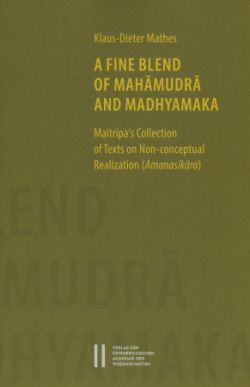

Die Sammlung von 26 Texten über vorstellungsfreie Verwirklichung ist das Ergebnis einer Synthese der Essenz- und tantrischen Mahāmudrā-Lehren von Saraha, Nāgārjuna und Śavaripa mit einer besonderen Form der Madhyamaka-Philosophie namens Nicht-gegründet-sein (apratiṣṭhāna), die auf die grundlegende Überwindung einer jeglichen konzeptionellen Bestimmung der Wirklichkeit abzielt. Dies erreicht man durch das Abziehen der Aufmerksamkeit von der Zweiheit eines wahrzunehmenden Objekts und eines wahrnehmenden Subjekts. Das Resultat ist eine „strahlende Selbst-Einweihung“, so Maitrīpas (986–1063) endgültige Analyse des Begriffs amanasikāra. Die Textsammlung über vorstellungsfreie Verwirklichung spielt eine bedeutende Rolle, da sie zusammen mit Naropas Belehrungen die hauptsächliche Quelle der bKa‘ brgyud-Überlieferungen bildet. Der Edition und Übersetzung dieser Sammlung folgt ein weiterer Maitrīpa zugeschriebener Text, die *Mahāmudrākanakamālā, welche von Mar pa Lo tsā ba Chos kyi blo gros (11. Jahrhundert) ins Tibetische übersetzt wurde. Die *Mahāmudrākanakamālā greift die Themen der Textsammlung auf und zeigt, dass alle Aspekte von Maitrīpa’s mahāmudrā in der Tat den frühen bKa’ brgyud-Meistern übermittelt wurden. Neben einer englischen Übersetzung und Analyse enthält die vorliegende Veröffentlichung eine neue Edition der vorhandenen Sanskrit-Texte auf der Grundlage von Haraprasad Shastri’s editio princeps, der Ausgabe der Studying Group of Sacred Tantric Texts an der Taisho-Universität, dem nepalesischen Manuskript NGMPP B 22/24 und dem Manuskript Nr. 151 der Todai-Universitätsbibliothek. Die tibetische Edition aller Texte basiert auf dem Derge und Peking bsTan ‘gyur sowie der dPal spungs-Ausgabe der vom siebten Karma pa Chos grags rgya mtsho (1454–1506) stammenden Sammlung indischer Mahāmudrā-Werke (Phyag rgya chen po’i rgya gzhung).
The collection of twenty-six texts on non-conceptual realization is the result of blending the essence and tantric mahāmudrā teachings of Saraha, Nāgārjuna and Śavaripa with a particular form of Madhyamaka philosophy, called ‘non-abiding’ (apratiṣṭhāna), which aims at radically transcending any conceptual assessment of true reality. This goal is achieved by “withdrawing one’s attention” (amanasikāra) from anything that involves the duality of a perceived and perceiver. The result is a “luminous self-empowerment,” Maitrīpa’s (986–1063) final tantric analysis of amanasikāra. The collection of texts on non-conceptual realization plays a crucial role, as it constitutes, together with Naropa’s teachings, the main source of bKa’ brgyud lineages. The edition and translation of this collection is followed by another text attributed to Maitrīpa, the *Mahāmudrākanakamālā, which was translated by Mar pa Lo tsā ba Chos kyi blo gros (11th century) into Tibetan. The *Mahāmudrākanakamālā picks up on the themes of the collection and shows that all aspects of Maitrīpa’s mahāmudrā were indeed passed on to early bKa’ brgyud masters. Besides an English translation and analysis, the present publication contains a new edition of the available Sanskrit on the basis of the editio princeps by Haraprasad Shastri, the edition of the Studying Group of Sacred Tantric Texts at Taisho University, the Nepalese manuscript NGMPP B 22/24, and the manuscript no. 151 from the Todai University Library. The Tibetan edition of all texts is based on the Derge and Peking bsTan ‘gyur and the dPal spungs edition of Karmapa VII Chos grags rgya mtsho’s (1454–1506) Collection of Indian Mahāmudrā Works (Phyag rgya chen po’i rgya gzhung).
2016,
978-3-7001-7786-9
978-3-7001-7929-0
580 Seiten,
22,5x15cm, broschiert